23 September 2022
Weekly Market View
The Fed leads yields higher, stocks lower
The US Federal Reserve took another decisive step this week to burnish its inflation-fighting credentials as it signalled an aggressive pace of rate hikes in the coming months. In doing so, we believe it has raised the odds of a US recession to 75% in the next 12 months.
As we have flagged in recent months, the near-term implications are likely significant. By the end of the year, we expect the 10-year US government bond yield to rise towards 4%, the 2-year yield to rise above 4.5% and the USD to strengthen further, resulting in a further drawdown in equities.
We prefer a three-pronged approach (the ‘3 Ds’) to mitigate the impact for investors: 1. De-risking of allocations; 2. Diversifying into less volatile USD-denominated Investment Grade corporate bonds; and 3. Increasing exposure to other income assets, including consistently high dividend paying equities.
Given the hawkish Fed stance, is it the right time to invest in income generating assets?
What are the implications of the latest Fed decision for equity investors?
What is the outlook for Emerging Market currencies, given USD strength?
Charts of the week: Where to seek refuge as the Fed keeps hiking
Asia USD and Developed Market bonds have historically provided attractive returns during similar regimes
Fed and money market estimates of the Fed policy rate*
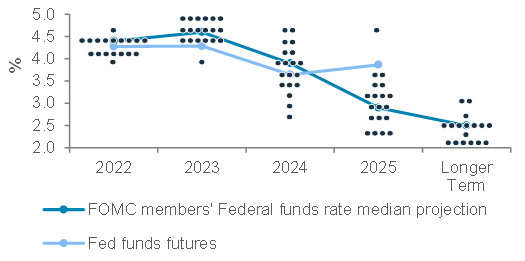
12m asset returns in a falling-growth, rising-inflation regime**
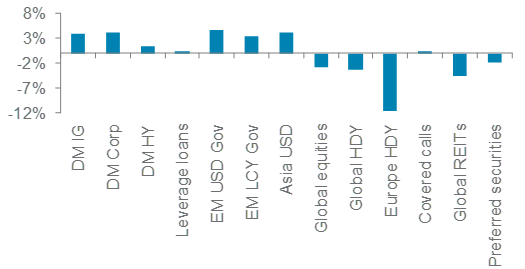
Source: Bloomberg, Standard Chartered; *dots represent Fed member forecasts; **global economic regimes identified by BCA Research (2005-21)
Editorial
The Fed leads yields higher, stocks lower
The US Federal Reserve took another decisive step this week to burnish its inflation-fighting credentials as it signalled an aggressive pace of rate hikes in the coming months. In doing so, we believe it has raised the odds of a US recession to 75% in the next 12 months. As we have flagged in recent months, the near-term implications are likely significant. By the year end, we expect the 10-year US government bond yield to rise towards 4%, the 2-year yield to rise above 4.5% and the USD to strengthen further, resulting in a further drawdown in equities.
The Fed, besides delivering its third consecutive 75bps rate hike, projected the benchmark rate to rise 125bps in the remaining two meetings of this year and another 25bps next year to a peak of 4.75%. Almost a third of the Fed’s 19 policymakers are more hawkish, projecting the so-called ‘terminal’ rate at 5% next year. That is steeper than the 4.5% money markets were pricing for the peak rate going into this week’s Fed meeting. The main message from the Fed was that it is willing to sacrifice growth to soften the US job market and accept an unemployment rate above its 4% long-term target so that it can sustainably bring down inflation towards its 2% goal.
As higher rates eventually lower growth and inflation, the central bank expects to cut rates in 2024, a year later than previous market expectations. At his press conference, Fed Chair Powell gave three conditions for pausing or slowing the pace of rate hikes: below-trend growth, softer labour markets and clear evidence that inflation is moving back to 2%. Based on the latest projections, while growth is expected to remain below trend until 2024 – driving up the unemployment rate to 4.4% by next year – inflation is not expected to return to the 2% target until 2025. This week’s lower-than-expected jobless claims is only likely to embolden the Fed. This portends higher-for-longer rates, in our view, which is likely to tighten global financial conditions, especially with the ECB and the BoE also hiking rates (the BoE delivered a 50bps hike this week to a 14-year high of 2.25%, even as it warned that the UK economy likely contracted again in the July-September quarter).
We prefer a three-pronged approach (the ‘3 Ds’) to mitigate the impact for investors: 1. De-risking of allocations by reducing exposure to equities and government bonds, which are among the most vulnerable to rising rates; 2. Diversifying into less volatile and high quality USD-denominated Investment Grade corporate bonds in Asia and the Developed Markets (DM), which now carry the added attraction of paying the highest yields in a decade; and 3. Increasing exposure to other income assets, including a basket of consistently high dividend paying equities, which tend to outperform in high inflation regimes.
Within equities, the de-risking could start with reducing exposure to Euro area equities, especially with the rising risk of another Russian incursion into Ukraine. There is also the risk of Russia cutting off oil supplies after having already sharply cut gas supplies to Europe. Meanwhile, the US S&P500 index, which entered a bear market this week for the second time this year, is likely to test June’s intra-day low of 3,637. Momentum indicators show US stocks are oversold in the near-term, but a break below June’s lows could lead to a test of 3250-3540. Stocks in Asia ex-Japan and UK offer much better value, in our view, given their 28% and 45% price-to-earnings discount vs. US equities. Asia ex-Japan stocks have the added advantage of a steady stream of policy stimulus from Mainland China. Next week’s China business confidence indicators (PMIs) will be closely watched for signs of further economic recovery.
Asia and DM USD-denominated corporate bonds are our top picks in bonds given their relatively low volatility and yields above 5%, which are likely to cushion against further rise in government bond yields. These bonds have historically delivered some of the highest returns in an environment of slowing growth and rising inflation (see chart above). They also provide exposure to the rising USD, which we expect to strengthen further in the next 3 months, despite Japan’s FX intervention to revive the JPY. History suggests unilateral FX interventions provide only a short-term respite, but underlying fundamentals (rate differentials) prevail over the medium term.
— Rajat Bhattacharya
The weekly macro balance sheet
Our weekly net assessment: On balance, we see the past week’s data and policy as negative for risk assets in the near term.
(+) factors: Easing China lockdowns, Euro area fiscal support
(-) factors: Hawkish Fed, ECB and BoE; Ukraine crisis
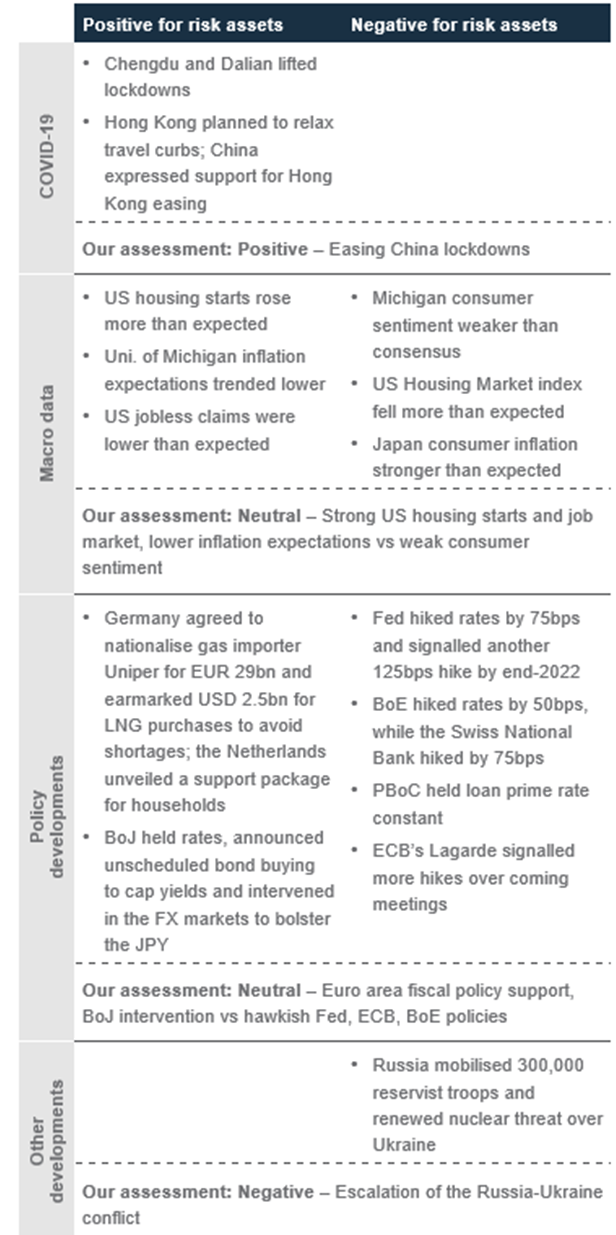
The Fed raised its US inflation, unemployment and rates forecasts and cut its growth estimates
Fed’s macroeconomic forecasts, September vs June
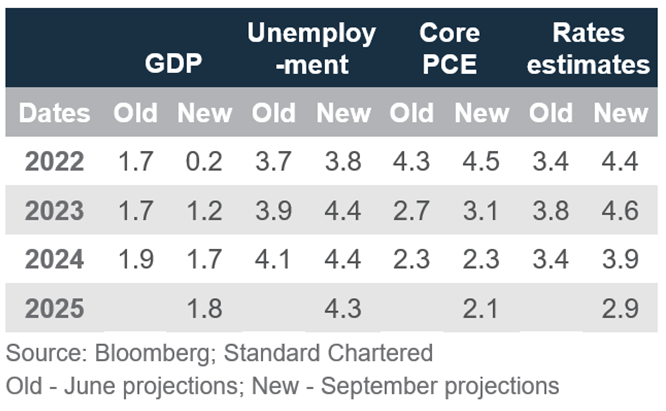
US housing starts rebounded in August, but the trend remains downward amid rising rates
US housing starts
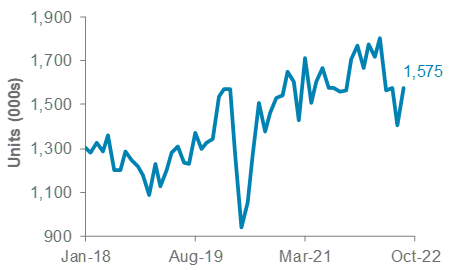
BoE rates are expected to rise just above Fed rates over the next two years, but the ECB and BoJ rates are expected to lag behind
Money market estimates of Fed, ECB, BoE and BoJ policy rates over the next two years
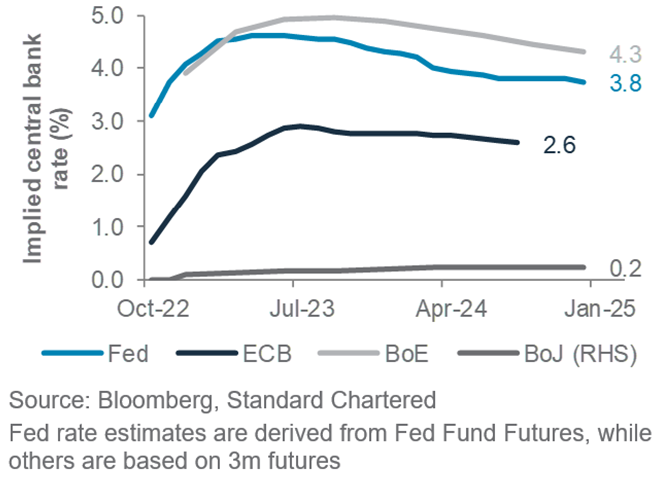
Top client questions
Given the hawkish Fed stance, is it the right time to invest in income generating assets?
By any count, the latest Fed meeting was a hawkish one. Fed guidance not only pointed to faster and higher rates than previously expected, but also highlighted its willingness to sacrifice growth to curb inflation.
Having said that, in our assessment, the level of long-term bond yields suggest markets are being pulled in opposite directions by the risk of a hawkish Fed and downside risks to growth. In this context, we expect the 10-year bond yield to rise towards 4% by the end of the year, before falling back towards the 3.5-3.75% range by the end of Q3 2023. Corporate bond yields across most major regions are trading close to their highest level in over a decade.
Additionally, history shows high dividend equities tend to outperform broader equity markets during periods of high inflation as their high dividend yield and generally lower P/E ratios make them less vulnerable to the impact of rising interest rates.
Together, these factors argue that while timing the peak in yields remains difficult, we believe risk/reward across bond and dividend yield equities are increasingly attractive to start adding exposure as part of income generation strategies.
— Abhilash Narayan, Senior Investment Strategist
Most higher yielding corporate and Emerging Market bonds now offer sufficient yield cushion to offset any decline in prices as a result of up to 1% rise in yields over a 12-month period
Simulated total returns of fixed income assets assuming different shifts in bond yields
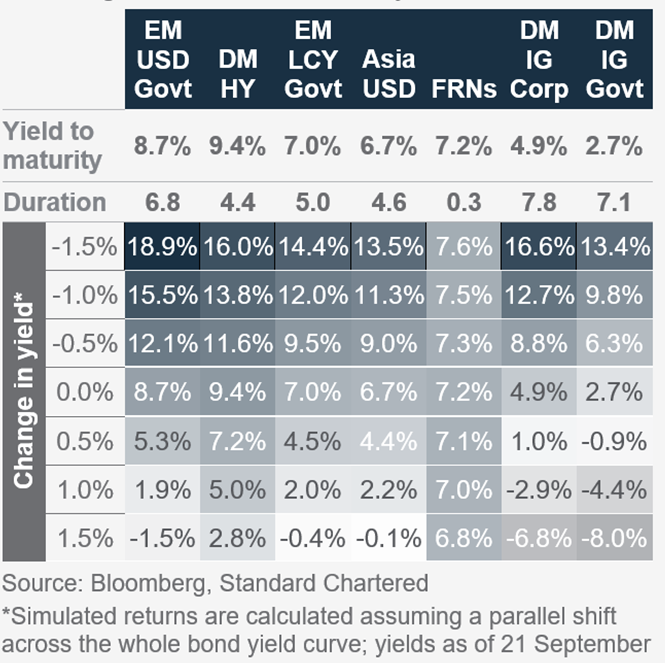
What are the implications of the latest Fed rate decision for equity investors?
A continued rise in the Fed policy rate poses a risk to equity markets because higher interest rates lead investors to apply a higher ‘discount’ to future corporate earnings, putting pressure on equity valuations. The rising rates come against the backdrop of faltering technical indicators – the S&P500 index has already broken below the 3,900 support level. Key support now sits at 3,637, which is the year-to-date intraday low reached in June. We believe it may be difficult to break that level in the short term as momentum indicators such as the RSI are already at heavily oversold levels. However, a scenario where the 3,637 level breaks could open the door to the S&P500 testing its next key support zone between 3,250 and 3,540.
This backdrop notwithstanding, we note that high-dividend equities outperform broader equity markets during rising inflation regimes due to their consistent earnings and income generation potential. We retain our sectoral preference for the energy sector globally, which continues to lead in terms of earnings. We also retain our preferred stance on UK equities due to the market’s high exposure to defensive sectors and high dividend yields relative to global equities.
— Michelle Kam, Investment Strategist
The next key support level for the S&P 500 index is at 3,637
S&P 500 Index
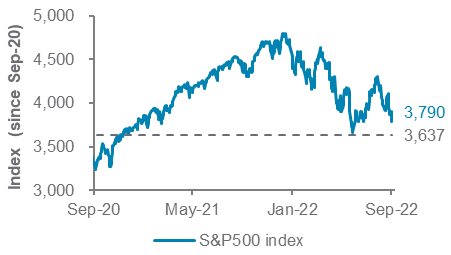
Top client questions (cont’d)
USD/CNH recently rose past 7. How will this affect China equities?
The CNH has weakened against the USD within the context of broad USD strength. Historically, a strong USD has been a headwind to Asia ex-Japan equities, including China equities. This is likely linked to capital flows, where a strong USD has been correlated with a flow of capital out of Emerging Markets and back towards the US. For Hong Kong-listed Mainland China equities trading in HKD (which, in turn, is pegged to the USD), the currency translation impact from a weaker CNH is also a headwind on HKD-denominated share prices. A stronger USD could also raise the cost for companies reliant on imported raw materials and energy.
On the other hand, MSCI China equities have a heavy domestic focus, generating 87% of their revenue domestically. As such, the majority of MSCI China companies are less exposed to currency fluctuations. Instead, government policies and China’s economic growth have a greater bearing on MSCI China equities. The investor base for onshore China equities is also strongly biased towards domestic Chinese investors. With China at a phase where policy is turning more stimulatory (as opposed tighter policies in the US and Europe), we continue to expect China equities to outperform global equities on a 12-month horizon.
— Fook Hien Yap, Senior Investment Strategist
Broad USD strength has historically been a headwind to Asia ex-Japan equities, including China equities
Relative performance of MSCI Asia ex-Japan to MSCI AC World and the US dollar DXY index (inverted axis)
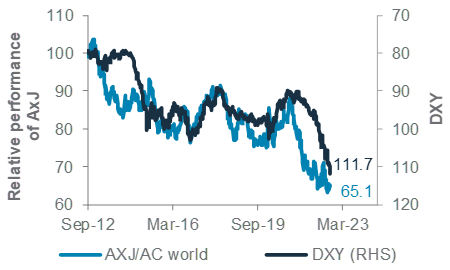
What is the outlook for EM currencies given the USD strength?
The USD surged to a fresh 20-year high after the Fed raised rates by 75bps and projected further hikes at upcoming meetings. Yield differentials continue to favour the USD, which, in turn, has been a key headwind for EM currencies this year. We believe that the USD uptrend has not exhausted itself, suggesting these headwinds could continue for EM currencies in the near term.
USD/CNH broke above the key psychological level of 7.00 last week. While the PBoC is likely to continue efforts to slow currency weakness, by setting stronger daily reference rates and cutting FX reserve requirements, for example, these are unlikely to be sufficient to completely reverse the current downtrend in the CNH. The next key resistance for the USD/CNH sits at 7.20. USD/SGD is also back above 1.42, a level last seen in 2020. The MAS is likely to continue tightening policy at its October meeting amid continued inflationary pressures in Singapore, offering further support to the SGD. Against the backdrop of a stronger USD, we believe USD/SGD is likely to be range-bound near-term, with support at 1.390 and resistance at 1.442.
— Nataniel Tang, Investment Strategist
USD/CNH continues to trend higher towards key resistance at 7.2
USD/CNH with technical levels
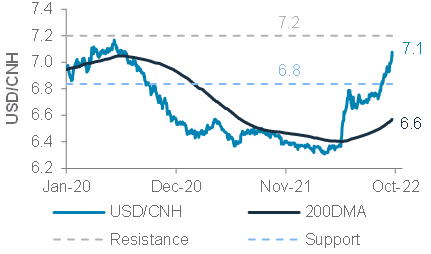
Market performance summary*
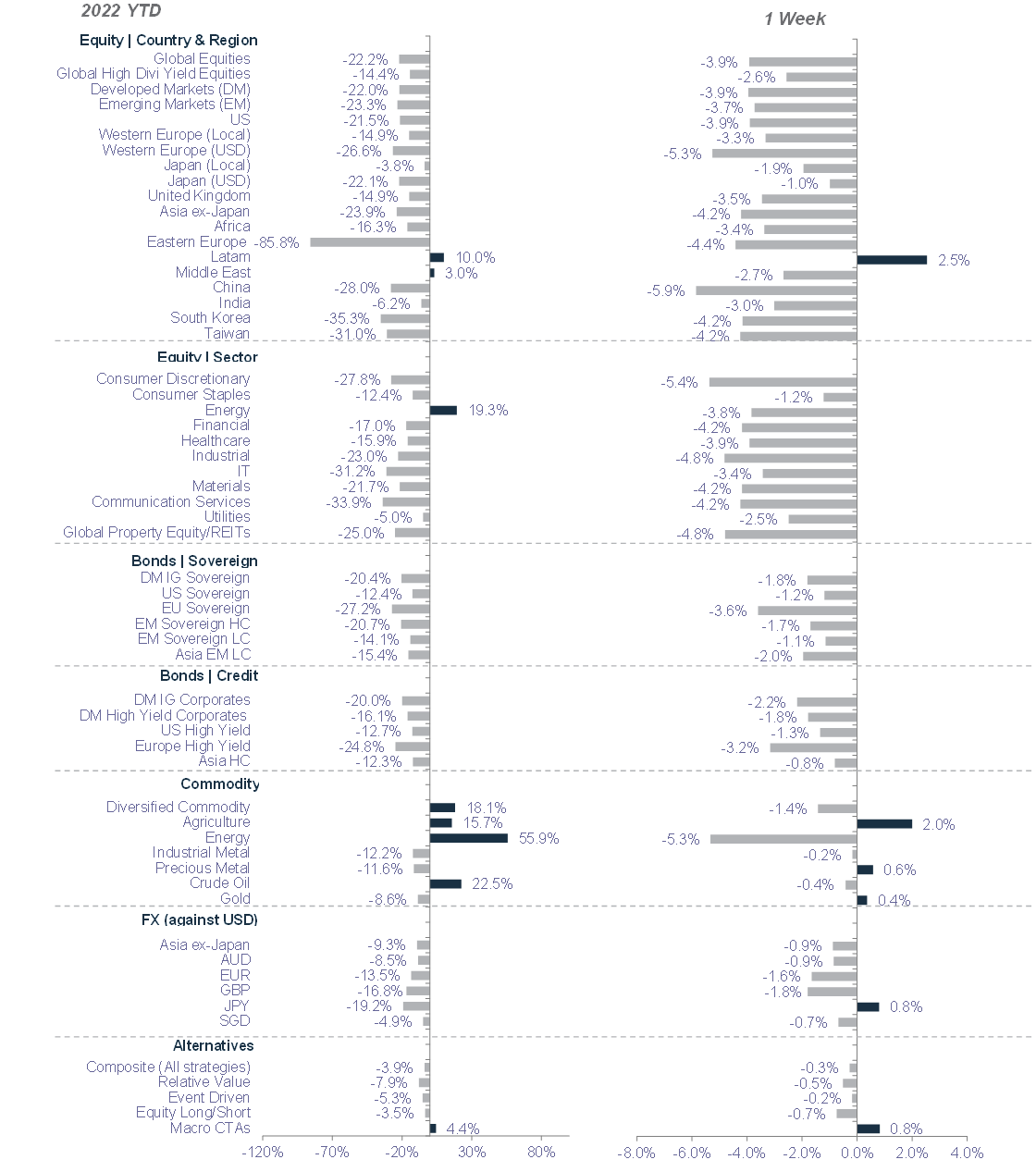
Our 12-month asset class views at a glance
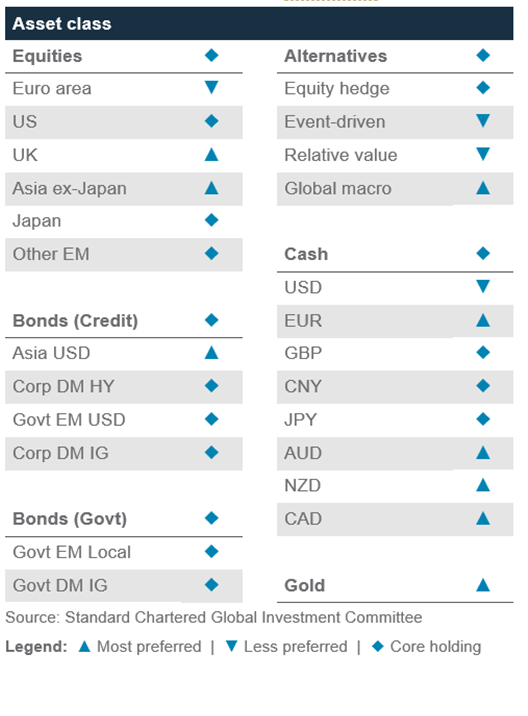
Economic and market calendar
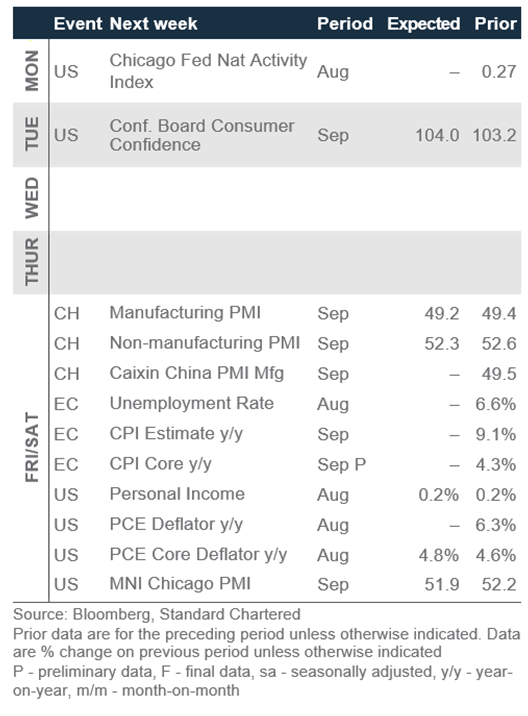
Next resistance for the US 10-year bond yield is at 3.8%
Technical indicators for key markets as on 22 September
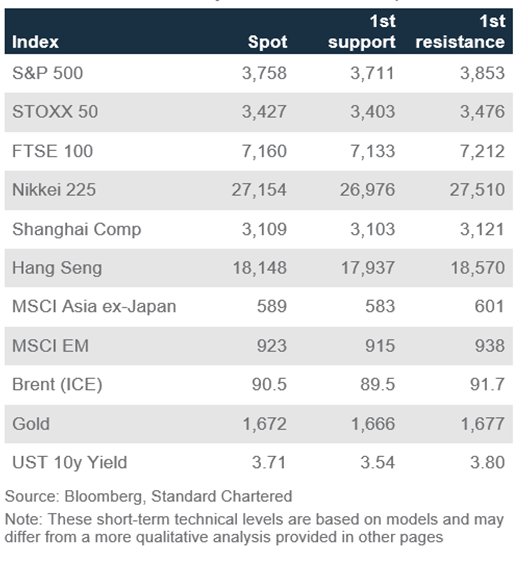
Investor diversity remains reasonably high across assets
Our proprietary market diversity indicators as of 22 September
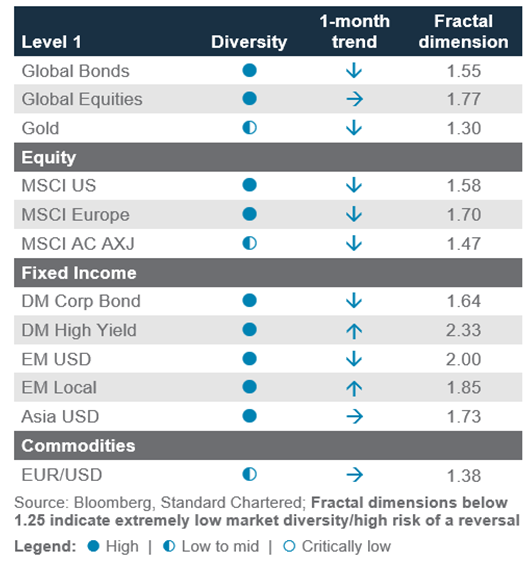
Disclosure
This document is confidential and may also be privileged. If you are not the intended recipient, please destroy all copies and notify the sender immediately. This document is being distributed for general information only and is subject to the relevant disclaimers available at our Standard Chartered website under Regulatory disclosures. It is not and does not constitute research material, independent research, an offer, recommendation or solicitation to enter into any transaction or adopt any hedging, trading or investment strategy, in relation to any securities or other financial instruments. This document is for general evaluation only. It does not take into account the specific investment objectives, financial situation or particular needs of any particular person or class of persons and it has not been prepared for any particular person or class of persons. You should not rely on any contents of this document in making any investment decisions. Before making any investment, you should carefully read the relevant offering documents and seek independent legal, tax and regulatory advice. In particular, we recommend you to seek advice regarding the suitability of the investment product, taking into account your specific investment objectives, financial situation or particular needs, before you make a commitment to purchase the investment product. Opinions, projections and estimates are solely those of SC at the date of this document and subject to change without notice. Past performance is not indicative of future results and no representation or warranty is made regarding future performance. The value of investments, and the income from them, can go down as well as up, and you may not recover the amount of your original investment. You are not certain to make a profit and may lose money. Any forecast contained herein as to likely future movements in rates or prices or likely future events or occurrences constitutes an opinion only and is not indicative of actual future movements in rates or prices or actual future events or occurrences (as the case may be). This document must not be forwarded or otherwise made available to any other person without the express written consent of the Standard Chartered Group (as defined below). Standard Chartered Bank is incorporated in England with limited liability by Royal Charter 1853 Reference Number ZC18. The Principal Office of the Company is situated in England at 1 Basinghall Avenue, London, EC2V 5DD. Standard Chartered Bank is authorised by the Prudential Regulation Authority and regulated by the Financial Conduct Authority and Prudential Regulation Authority. Standard Chartered PLC, the ultimate parent company of Standard Chartered Bank, together with its subsidiaries and affiliates (including each branch or representative office), form the Standard Chartered Group. Standard Chartered Private Bank is the private banking division of Standard Chartered. Private banking activities may be carried out internationally by different legal entities and affiliates within the Standard Chartered Group (each an “SC Group Entity”) according to local regulatory requirements. Not all products and services are provided by all branches, subsidiaries and affiliates within the Standard Chartered Group. Some of the SC Group Entities only act as representatives of Standard Chartered Private Bank and may not be able to offer products and services or offer advice to clients.
Copyright © 2024, Accounting Research & Analytics, LLC d/b/a CFRA (and its affiliates, as applicable). Reproduction of content provided by CFRA in any form is prohibited except with the prior written permission of CFRA. CFRA content is not investment advice and a reference to or observation concerning a security or investment provided in the CFRA SERVICES is not a recommendation to buy, sell or hold such investment or security or make any other investment decisions. The CFRA content contains opinions of CFRA based upon publicly-available information that CFRA believes to be reliable and the opinions are subject to change without notice. This analysis has not been submitted to, nor received approval from, the United States Securities and Exchange Commission or any other regulatory body. While CFRA exercised due care in compiling this analysis, CFRA, ITS THIRD-PARTY SUPPLIERS, AND ALL RELATED ENTITIES SPECIFICALLY DISCLAIM ALL WARRANTIES, EXPRESS OR IMPLIED, INCLUDING, BUT NOT LIMITED TO, ANY WARRANTIES OF MERCHANTABILITY OR FITNESS FOR A PARTICULAR PURPOSE OR USE, to the full extent permitted by law, regarding the accuracy, completeness, or usefulness of this information and assumes no liability with respect to the consequences of relying on this information for investment or other purposes. No content provided by CFRA (including ratings, credit-related analyses and data, valuations, model, software or other application or output therefrom) or any part thereof may be modified, reverse engineered, reproduced or distributed in any form by any means, or stored in a database or retrieval system, without the prior written permission of CFRA, and such content shall not be used for any unlawful or unauthorized purposes. CFRA and any third-party providers, as well as their directors, officers, shareholders, employees or agents do not guarantee the accuracy, completeness, timeliness or availability of such content. In no event shall CFRA, its affiliates, or their third-party suppliers be liable for any direct, indirect, special, or consequential damages, costs, expenses, legal fees, or losses (including lost income or lost profit and opportunity costs) in connection with a subscriber’s, subscriber’s customer’s, or other’s use of CFRA’s content.
Market Abuse Regulation (MAR) Disclaimer
Banking activities may be carried out internationally by different branches, subsidiaries and affiliates within the Standard Chartered Group according to local regulatory requirements. Opinions may contain outright “buy”, “sell”, “hold” or other opinions. The time horizon of this opinion is dependent on prevailing market conditions and there is no planned frequency for updates to the opinion. This opinion is not independent of Standard Chartered Group’s trading strategies or positions. Standard Chartered Group and/or its affiliates or its respective officers, directors, employee benefit programmes or employees, including persons involved in the preparation or issuance of this document may at any time, to the extent permitted by applicable law and/or regulation, be long or short any securities or financial instruments referred to in this document or have material interest in any such securities or related investments. Therefore, it is possible, and you should assume, that Standard Chartered Group has a material interest in one or more of the financial instruments mentioned herein. Please refer to our Standard Chartered website under Regulatory disclosures for more detailed disclosures, including past opinions/ recommendations in the last 12 months and conflict of interests, as well as disclaimers. A covering strategist may have a financial interest in the debt or equity securities of this company/issuer. This document must not be forwarded or otherwise made available to any other person without the express written consent of Standard Chartered Group.
Sustainable Investments
Any ESG data used or referred to has been provided by Morningstar, Sustainalytics, MSCI or Bloomberg. Refer to 1) Morningstar website under Sustainable Investing, 2) Sustainalytics website under ESG Risk Ratings, 3) MCSI website under ESG Business Involvement Screening Research for more information. The ESG data is as at the date of publication based on data provided, is for informational purpose only and is not warranted to be complete, timely, accurate or suitable for a particular purpose, and it may be subject to change. Sustainable Investments (SI): This refers to funds that have been classified as ‘Sustainable Investments’ by Morningstar. SI funds have explicitly stated in their prospectus and regulatory filings that they either incorporate ESG factors into the investment process or have a thematic focus on the environment, gender diversity, low carbon, renewable energy, water or community development. For equity, it refers to shares/stocks issued by companies with Sustainalytics ESG Risk Rating of Low/Negligible. For bonds, it refers to debt instruments issued by issuers with Sustainalytics ESG Risk Rating of Low/Negligible, and/or those being certified green, social, sustainable bonds. For structured products, it refers to products that are issued by any issuer who has a Sustainable Finance framework that aligns with Standard Chartered’s Green and Sustainable Product Framework, with underlying assets that are part of the Sustainable Investment universe or separately approved by Standard Chartered’s Sustainable Finance Governance Committee.
Country/Market Specific Disclosures
Botswana: This document is being distributed in Botswana by, and is attributable to, Standard Chartered Bank Botswana Limited which is a financial institution licensed under the Section 6 of the Banking Act CAP 46.04 and is listed in the Botswana Stock Exchange. Brunei Darussalam: This document is being distributed in Brunei Darussalam by, and is attributable to, Standard Chartered Bank (Brunei Branch) | Registration Number RFC/61 and Standard Chartered Securities (B) Sdn Bhd | Registration Number RC20001003. Standard Chartered Bank is incorporated in England with limited liability by Royal Charter 1853 Reference Number ZC18. Standard Chartered Securities (B) Sdn Bhd is a limited liability company registered with the Registry of Companies with Registration Number RC20001003 and licensed by Brunei Darussalam Central Bank as a Capital Markets Service License Holder with License Number BDCB/R/CMU/S3-CL and it is authorised to conduct Islamic investment business through an Islamic window. China Mainland: This document is being distributed in China by, and is attributable to, Standard Chartered Bank (China) Limited which is mainly regulated by National Financial Regulatory Administration (NFRA), State Administration of Foreign Exchange (SAFE), and People’s Bank of China (PBOC). Hong Kong: In Hong Kong, this document, except for any portion advising on or facilitating any decision on futures contracts trading, is distributed by Standard Chartered Bank (Hong Kong) Limited (“SCBHK”), a subsidiary of Standard Chartered PLC. SCBHK has its registered address at 32/F, Standard Chartered Bank Building, 4-4A Des Voeux Road Central, Hong Kong and is regulated by the Hong Kong Monetary Authority and registered with the Securities and Futures Commission (“SFC”) to carry on Type 1 (dealing in securities), Type 4 (advising on securities), Type 6 (advising on corporate finance) and Type 9 (asset management) regulated activity under the Securities and Futures Ordinance (Cap. 571) (“SFO”) (CE No. AJI614). The contents of this document have not been reviewed by any regulatory authority in Hong Kong and you are advised to exercise caution in relation to any offer set out herein. If you are in doubt about any of the contents of this document, you should obtain independent professional advice. Any product named herein may not be offered or sold in Hong Kong by means of any document at any time other than to “professional investors” as defined in the SFO and any rules made under that ordinance. In addition, this document may not be issued or possessed for the purposes of issue, whether in Hong Kong or elsewhere, and any interests may not be disposed of, to any person unless such person is outside Hong Kong or is a “professional investor” as defined in the SFO and any rules made under that ordinance, or as otherwise may be permitted by that ordinance. In Hong Kong, Standard Chartered Private Bank is the private banking division of SCBHK, a subsidiary of Standard Chartered PLC. Ghana: Standard Chartered Bank Ghana Limited accepts no liability and will not be liable for any loss or damage arising directly or indirectly (including special, incidental or consequential loss or damage) from your use of these documents. Past performance is not indicative of future results and no representation or warranty is made regarding future performance. You should seek advice from a financial adviser on the suitability of an investment for you, taking into account these factors before making a commitment to invest in an investment. To unsubscribe from receiving further updates, please send an email to feedback.ghana@sc.com. Please do not reply to this email. Call our Priority Banking on 0302610750 for any questions or service queries. You are advised not to send any confidential and/or important information to Standard Chartered via e-mail, as Standard Chartered makes no representations or warranties as to the security or accuracy of any information transmitted via e-mail. Standard Chartered shall not be responsible for any loss or damage suffered by you arising from your decision to use e-mail to communicate with the Bank. India: This document is being distributed in India by Standard Chartered in its capacity as a distributor of mutual funds and referrer of any other third party financial products. Standard Chartered does not offer any ‘Investment Advice’ as defined in the Securities and Exchange Board of India (Investment Advisers) Regulations, 2013 or otherwise. Services/products related securities business offered by Standard Charted are not intended for any person, who is a resident of any jurisdiction, the laws of which imposes prohibition on soliciting the securities business in that jurisdiction without going through the registration requirements and/or prohibit the use of any information contained in this document. Indonesia: This document is being distributed in Indonesia by Standard Chartered Bank, Indonesia branch, which is a financial institution licensed, registered and supervised by Otoritas Jasa Keuangan (Financial Service Authority). Jersey: In Jersey, Standard Chartered Private Bank is the Registered Business Name of the Jersey Branch of Standard Chartered Bank. The Jersey Branch of Standard Chartered Bank is regulated by the Jersey Financial Services Commission. Copies of the latest audited accounts of Standard Chartered Bank are available from its principal place of business in Jersey: PO Box 80, 15 Castle Street, St Helier, Jersey JE4 8PT. Standard Chartered Bank is incorporated in England with limited liability by Royal Charter in 1853 Reference Number ZC 18. The Principal Office of the Company is situated in England at 1 Basinghall Avenue, London, EC2V 5DD. Standard Chartered Bank is authorised by the Prudential Regulation Authority and regulated by the Financial Conduct Authority and Prudential Regulation Authority. The Jersey Branch of Standard Chartered Bank is also an authorised financial services provider under license number 44946 issued by the Financial Sector Conduct Authority of the Republic of South Africa. Jersey is not part of the United Kingdom and all business transacted with Standard Chartered Bank, Jersey Branch and other SC Group Entity outside of the United Kingdom, are not subject to some or any of the investor protection and compensation schemes available under United Kingdom law. Kenya: This document is being distributed in Kenya by, and is attributable to Standard Chartered Bank Kenya Limited. Investment Products and Services are distributed by Standard Chartered Investment Services Limited, a wholly owned subsidiary of Standard Chartered Bank Kenya Limited that is licensed by the Capital Markets Authority as a Fund Manager. Standard Chartered Bank Kenya Limited is regulated by the Central Bank of Kenya. Malaysia: This document is being distributed in Malaysia by Standard Chartered Bank Malaysia Berhad. Recipients in Malaysia should contact Standard Chartered Bank Malaysia Berhad in relation to any matters arising from, or in connection with, this document. Nigeria: This document is being distributed in Nigeria by Standard Chartered Bank Nigeria Limited, a bank duly licensed and regulated by the Central Bank of Nigeria. Standard Chartered accepts no liability for any loss or damage arising directly or indirectly (including special, incidental or consequential loss or damage) from your use of these documents. You should seek advice from a financial adviser on the suitability of an investment for you, taking into account these factors before making a commitment to invest in an investment. To unsubscribe from receiving further updates, please send an email to clientcare.ng@sc.com requesting to be removed from our mailing list. Please do not reply to this email. Call our Priority Banking on 01-2772514 for any questions or service queries. Standard Chartered shall not be responsible for any loss or damage arising from your decision to send confidential and/or important information to Standard Chartered via e-mail, as Standard Chartered makes no representations or warranties as to the security or accuracy of any information transmitted via e-mail. Pakistan: This document is being distributed in Pakistan by, and attributable to Standard Chartered Bank (Pakistan) Limited having its registered office at PO Box 5556, I.I Chundrigar Road Karachi, which is a banking company registered with State Bank of Pakistan under Banking Companies Ordinance 1962 and is also having licensed issued by Securities & Exchange Commission of Pakistan for Security Advisors. Standard Chartered Bank (Pakistan) Limited acts as a distributor of mutual funds and referrer of other third-party financial products. Singapore: This document is being distributed in Singapore by, and is attributable to, Standard Chartered Bank (Singapore) Limited (Registration No. 201224747C/ GST Group Registration No. MR-8500053-0, “SCBSL”). Recipients in Singapore should contact SCBSL in relation to any matters arising from, or in connection with, this document. SCBSL is an indirect wholly owned subsidiary of Standard Chartered Bank and is licensed to conduct banking business in Singapore under the Singapore Banking Act, 1970. Standard Chartered Private Bank is the private banking division of SCBSL. IN RELATION TO ANY SECURITY OR SECURITIES-BASED DERIVATIVES CONTRACT REFERRED TO IN THIS DOCUMENT, THIS DOCUMENT, TOGETHER WITH THE ISSUER DOCUMENTATION, SHALL BE DEEMED AN INFORMATION MEMORANDUM (AS DEFINED IN SECTION 275 OF THE SECURITIES AND FUTURES ACT, 2001 (“SFA”)). THIS DOCUMENT IS INTENDED FOR DISTRIBUTION TO ACCREDITED INVESTORS, AS DEFINED IN SECTION 4A(1)(a) OF THE SFA, OR ON THE BASIS THAT THE SECURITY OR SECURITIES-BASED DERIVATIVES CONTRACT MAY ONLY BE ACQUIRED AT A CONSIDERATION OF NOT LESS THAN S$200,000 (OR ITS EQUIVALENT IN A FOREIGN CURRENCY) FOR EACH TRANSACTION. Further, in relation to any security or securities-based derivatives contract, neither this document nor the Issuer Documentation has been registered as a prospectus with the Monetary Authority of Singapore under the SFA. Accordingly, this document and any other document or material in connection with the offer or sale, or invitation for subscription or purchase, of the product may not be circulated or distributed, nor may the product be offered or sold, or be made the subject of an invitation for subscription or purchase, whether directly or indirectly, to persons other than a relevant person pursuant to section 275(1) of the SFA, or any person pursuant to section 275(1A) of the SFA, and in accordance with the conditions specified in section 275 of the SFA, or pursuant to, and in accordance with the conditions of, any other applicable provision of the SFA. In relation to any collective investment schemes referred to in this document, this document is for general information purposes only and is not an offering document or prospectus (as defined in the SFA). This document is not, nor is it intended to be (i) an offer or solicitation of an offer to buy or sell any capital markets product; or (ii) an advertisement of an offer or intended offer of any capital markets product. Deposit Insurance Scheme: Singapore dollar deposits of non-bank depositors are insured by the Singapore Deposit Insurance Corporation, for up to S$100,000 in aggregate per depositor per Scheme member by law. Foreign currency deposits, dual currency investments, structured deposits and other investment products are not insured. This advertisement has not been reviewed by the Monetary Authority of Singapore. Taiwan: SC Group Entity or Standard Chartered Bank (Taiwan) Limited (“SCB (Taiwan)”) may be involved in the financial instruments contained herein or other related financial instruments. The author of this document may have discussed the information contained herein with other employees or agents of SC or SCB (Taiwan). The author and the above-mentioned employees of SC or SCB (Taiwan) may have taken related actions in respect of the information involved (including communication with customers of SC or SCB (Taiwan) as to the information contained herein). The opinions contained in this document may change, or differ from the opinions of employees of SC or SCB (Taiwan). SC and SCB (Taiwan) will not provide any notice of any changes to or differences between the above-mentioned opinions. This document may cover companies with which SC or SCB (Taiwan) seeks to do business at times and issuers of financial instruments. Therefore, investors should understand that the information contained herein may serve as specific purposes as a result of conflict of interests of SC or SCB (Taiwan). SC, SCB (Taiwan), the employees (including those who have discussions with the author) or customers of SC or SCB (Taiwan) may have an interest in the products, related financial instruments or related derivative financial products contained herein; invest in those products at various prices and on different market conditions; have different or conflicting interests in those products. The potential impacts include market makers’ related activities, such as dealing, investment, acting as agents, or performing financial or consulting services in relation to any of the products referred to in this document. UAE: DIFC – Standard Chartered Bank is incorporated in England with limited liability by Royal Charter 1853 Reference Number ZC18.The Principal Office of the Company is situated in England at 1 Basinghall Avenue, London, EC2V 5DD. Standard Chartered Bank is authorised by the Prudential Regulation Authority and regulated by the Financial Conduct Authority and Prudential Regulation Authority. Standard Chartered Bank, Dubai International Financial Centre having its offices at Dubai International Financial Centre, Building 1, Gate Precinct, P.O. Box 999, Dubai, UAE is a branch of Standard Chartered Bank and is regulated by the Dubai Financial Services Authority (“DFSA”). This document is intended for use only by Professional Clients and is not directed at Retail Clients as defined by the DFSA Rulebook. In the DIFC we are authorised to provide financial services only to clients who qualify as Professional Clients and Market Counterparties and not to Retail Clients. As a Professional Client you will not be given the higher retail client protection and compensation rights and if you use your right to be classified as a Retail Client we will be unable to provide financial services and products to you as we do not hold the required license to undertake such activities. For Islamic transactions, we are acting under the supervision of our Shariah Supervisory Committee. Relevant information on our Shariah Supervisory Committee is currently available on the Standard Chartered Bank website in the Islamic banking section For residents of the UAE – Standard Chartered Bank UAE does not provide financial analysis or consultation services in or into the UAE within the meaning of UAE Securities and Commodities Authority Decision No. 48/r of 2008 concerning financial consultation and financial analysis. Uganda: Our Investment products and services are distributed by Standard Chartered Bank Uganda Limited, which is licensed by the Capital Markets Authority as an investment adviser. United Kingdom: In the UK, Standard Chartered Bank is authorised by the Prudential Regulation Authority and regulated by the Financial Conduct Authority and Prudential Regulation Authority. This communication has been approved by Standard Chartered Bank for the purposes of Section 21 (2) (b) of the United Kingdom’s Financial Services and Markets Act 2000 (“FSMA”) as amended in 2010 and 2012 only. Standard Chartered Bank (trading as Standard Chartered Private Bank) is an authorised financial services provider (license number 45747) in terms of the South African Financial Advisory and Intermediary Services Act, 2002. The Materials have not been prepared in accordance with UK legal requirements designed to promote the independence of investment research, and that it is not subject to any prohibition on dealing ahead of the dissemination of investment research. Vietnam: This document is being distributed in Vietnam by, and is attributable to, Standard Chartered Bank (Vietnam) Limited which is mainly regulated by State Bank of Vietnam (SBV). Recipients in Vietnam should contact Standard Chartered Bank (Vietnam) Limited for any queries regarding any content of this document. Zambia: This document is distributed by Standard Chartered Bank Zambia Plc, a company incorporated in Zambia and registered as a commercial bank and licensed by the Bank of Zambia under the Banking and Financial Services Act Chapter 387 of the Laws of Zambia.
